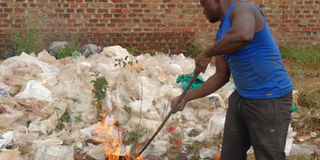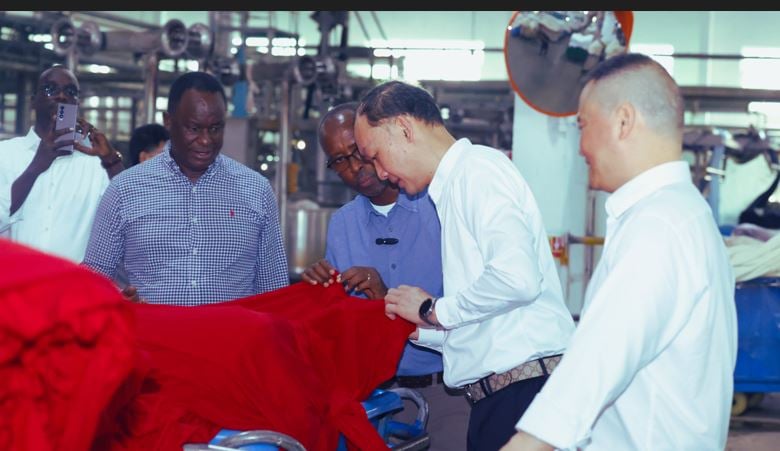Kibugo earns money recycling plastic waste into pavers

Great technique. The youthful entreprenuer mixes sand with melted plastic. PHOTOS BY PHILLIP WAFULA
What you need to know:
- Super Approach. A youthful entrepreneur has come up with a way to use plastic waste instead of cement to make ‘eco-friendly’ paving slabs.
- His initiative, which seen him employ former street children, has been growing, but still faces challenges, writes Yazid Yolisigira.
As most urban centres grapple with a mounting trash problem, one local man is taking matters into his own hands by recycling plastic waste into eco-friendly slabbing pavers to earn a living.
Plastic waste has become a major problem. It blocks drain canals, pollutes rivers and wreaks havoc on the environment. However, Sharif Kibugo a 35-year-old man in Iganga District has turned the waste into an income-generating venture by making building pavers from them.
Whereas some residents of Iganga Municipal Council have perceived garbage as a waste, Kibugo and his colleagues have gone to the streets from where they pick littered wastes of polythene papers to make money.
How he started
Kibugo, a resident of Bulubandi Village in Iganga Municipality, says he acquired the skills in November 2016 after an encounter with tourists during a tour of Mombasa, Kenya.
According to him, he found the tourists from Europe at one of the hotels constructing a building using pavers which they claimed were produced from polythene wastes.
“I admired how they were turning the paper wastes into something valuable, learnt the skills and since then, I have not turned back,” he said, adding that when he returned to Iganga, he decided to give it a try. “I was energised by the fact that Iganga Town is littered with polythene waste and it was coincidental that residents were always staging demonstrations over uncollected garbage when I started,” he recalls of his breakthrough.
When Sunday Monitor visited Kibugo’s home last week, this reporter was welcomed by heaps of polythene paper wastes and building pavers in the compound while the proprietor and two employees were found producing the pavers.
Process
To make the pavers, the group first uses firewood to burn the plastic and polythene papers in a huge boiler until it melts.
They then mix lake sand into the liquid; and as they mingle. The employees then pour the mix of plastic and sand into vats to make pavers in different shapes.
“We put the polythene and other plastics in a boiler and heat it until it turns into a liquid. We then mix lake sand into this liquid and stir for 30 minutes when it turns solid. The mixture is then poured into paver shapers and covered for two minutes. The end product is removed and left to cool for 15 minutes,” Kibugo explains.
Profit driven
On a good day, Kibugo says about 300 pavers are produced with each sold at Shs1,500, adding that their products are mainly taken by hotels and filling stations’ builders.
Kibugo and his employees have used the revenue from this activity to support their families.
“We were trying to come up with a product and then find the best type of garbage to make it,” he says.
Without that realisation, Kibugo reckons his business could never have been profitable.
Challenges
Although the activity earns them a daily income, Kibugo says they lack of a bigger boiler is affecting their productivity.
“The challenge we have is that we lack bigger boilers and request government and well-wishers to come to our rescue to enable us produce 1,000 pavers a day,” he said.
Baker Magaya, one of the employees, said they are often belittled whenever they go out in search of the materials.
“When people find us on garbage pits, they call us ‘mentally ill’ and sometimes chase us away” he said, arguing that by collecting the littered polythene from the streets, they are not only ridding the town of garbage but conserving the environment.
David Balaba, the Iganga Municipality mayor, while echoing Mr Magaya’s sentiment, applauded Mr Kibugo and his team for coming up with the initiative. He says turning polythene waste into valuable products is not only helping to get rid of garbage in town but also conserving the environment.
“The polythene papers are destroying the environment and eroding the soil and its nutrients, so recycling it into valuable products is really commendable. I wish environmentalists could support them,” Balaba said.
Abdu Samanya, the Iganga district natural resources officer, also commended the project and asked residents to come up with ventures that will help to conserve the environment.
“Poor disposal of garbage was ruining the environment and I ask government to establish a garbage recycling plant in the area,” he said.




